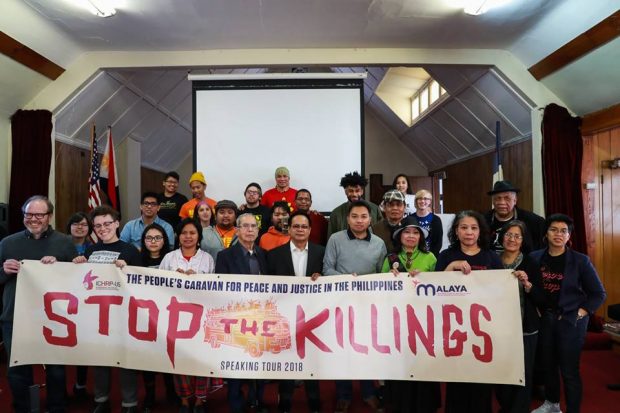CPP, Makabayan condemn violent dispersal of Nutriasia workers
By April Burcer
The Communist Party of the Philippines (CPP) and the Makabayan bloc at the House of Representatives separately condemned the brutal dispersal of NutriAsia workers that led to the arrest of 20 people as well as the wounding of several strikers Thursday.
In separate statements, both organizations criticized the unnecessary use of force in dispersing the workers who have been holding a strike for 13 days to fight for regularization and better working conditions.
CPP said that “NutriAsia workers are demanding the regularization of more than a thousand contractual workers and the reinstatement of union leaders dismissed by the company.”
Out of the 1400 workers in NutriaAsia, only 100 of them are regular employees and the rest are employed by six subcontracting agencies, Jessie Gerola, chairperson of the union Nagkakaisang Manggagawa ng NutriAsia said in an earlier interview.
The Makabayan bloc, composed of Carlos Isagani Zarate of Bayan Muna, Antonio Tinio and France Castro of ACT Teachers, Emmi de Jesus and Arlene Brosas of Gabriela Women’s Party, Ariel Casilao of Anakpawis and Sarah Elago of Kabataan party-list, on the other hand, called for an investigation on the contractualization policy and the working environment in NutriAsia.
“The workers are only asking to become regular employees of Nutriasia after working in the factory for as long as 15 years, but the company’s and court’s response is a violent dispersal,” the bloc said.
“The Party enjoins the broad masses of workers, students and other sectors to extend support and solidarity with the striking workers of Nutriasia, as well as workers in other companies, in their struggle to defend their right to regular jobs and for wage increases,” CPP wrote.
It started with a clap
News reports said that the strike was prompted by the dismissal of about 50 workers who participated in an earlier protest against the sacking of five union leaders along with their members.
The workers clapped as a way of condemning the termination of the union leaders without reasonable grounds, reports said.
Last February, Department of Labor and Employment (DOLE) ordered NutriAsia and its three contractors –Alternative Network Resources Unlimited Multipurpose Cooperative, Serbiz Multipurpose Cooperative and B-Mirk Enterprises Corporation – to regularize 914 of their workers, which never happened.
NutriAsia is a large condiment company owned by Joselito Campos Jr. and known for its products such as Datu Puti vinegars and soy sauces, Mang Tomas all-purpose sauce, UFC ketchups, Jufran ketchup, and Golden Fiesta cooking oil.
Other activist organizations have also called for a boycott of all NutriAsia products while the labor dispute remain unresolved. #


